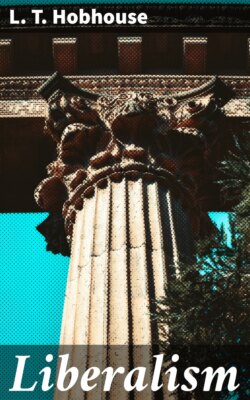Liberalism

Реклама. ООО «ЛитРес», ИНН: 7719571260.
Оглавление
L. T. Hobhouse. Liberalism
Liberalism
Table of Contents
CHAPTER I
BEFORE LIBERALISM
FOOTNOTE:
CHAPTER II
THE ELEMENTS OF LIBERALISM
FOOTNOTES:
CHAPTER III
THE MOVEMENT OF THEORY
FOOTNOTES:
CHAPTER IV
'LAISSEZ-FAIRE'
FOOTNOTES:
CHAPTER V
GLADSTONE AND MILL
CHAPTER VI
THE HEART OF LIBERALISM
FOOTNOTE:
CHAPTER VII
THE STATE AND THE INDIVIDUAL
FOOTNOTES:
CHAPTER VIII
ECONOMIC LIBERALISM
FOOTNOTE:
CHAPTER IX
THE FUTURE OF LIBERALISM
FOOTNOTES:
BIBLIOGRAPHY
INDEX
Отрывок из книги
L. T. Hobhouse
Published by Good Press, 2019
.....
Of political liberty it will be more convenient to speak later. But let us here observe that there is another avenue by which it can be, and, in fact, was, approached. We have seen that the reign of law is the first step to liberty. A man is not free when he is controlled by other men, but only when he is controlled by principles and rules which all society must obey, for the community is the true master of the free man. But here we are only at the beginning of the matter. There may be law, and there may be no attempt, such as the Stuarts made, to set law aside, yet (1) the making and maintenance of law may depend on the will of the sovereign or of an oligarchy, and (2) the content of the law may be unjust and oppressive to some, to many, or to all except those who make it. The first point brings us back to the problem of political liberty, which we defer. The second opens questions which have occupied a great part of the history of Liberalism, and to deal with them we have to ask what types of law have been felt as peculiarly oppressive, and in what respects it has been necessary to claim liberty not merely through law, but by the abolition of bad law and tyrannical administration.
In the first place, there is the sphere of what is called personal liberty—a sphere most difficult to define, but the arena of the fiercest strife of passion and the deepest feelings of mankind. At the basis lies liberty of thought—freedom from inquisition into opinions that a man forms in his own mind[3]—the inner citadel where, if anywhere, the individual must rule. But liberty of thought is of very little avail without liberty to exchange thoughts—since thought is mainly a social product; and so with liberty of thought goes liberty of speech and liberty of writing, printing, and peaceable discussion. These rights are not free from difficulty and dubiety. There is a point at which speech becomes indistinguishable from action, and free speech may mean the right to create disorder. The limits of just liberty here are easy to draw neither in theory nor in practice. They lead us immediately to one of the points at which liberty and order may be in conflict, and it is with conflicts of this kind that we shall have to deal. The possibilities of conflict are not less in relation to the connected right of liberty in religion. That this liberty is absolute cannot be contended. No modern state would tolerate a form of religious worship which should include cannibalism, human sacrifice, or the burning of witches. In point of fact, practices of this kind—which follow quite naturally from various forms of primitive belief that are most sincerely held—are habitually put down by civilized peoples that are responsible for the government of less developed races. The British law recognizes polygamy in India, but I imagine it would not be open either to a Mahommedan or a Hindu to contract two marriages in England. Nor is it for liberty of this kind that the battle has been fought.
.....